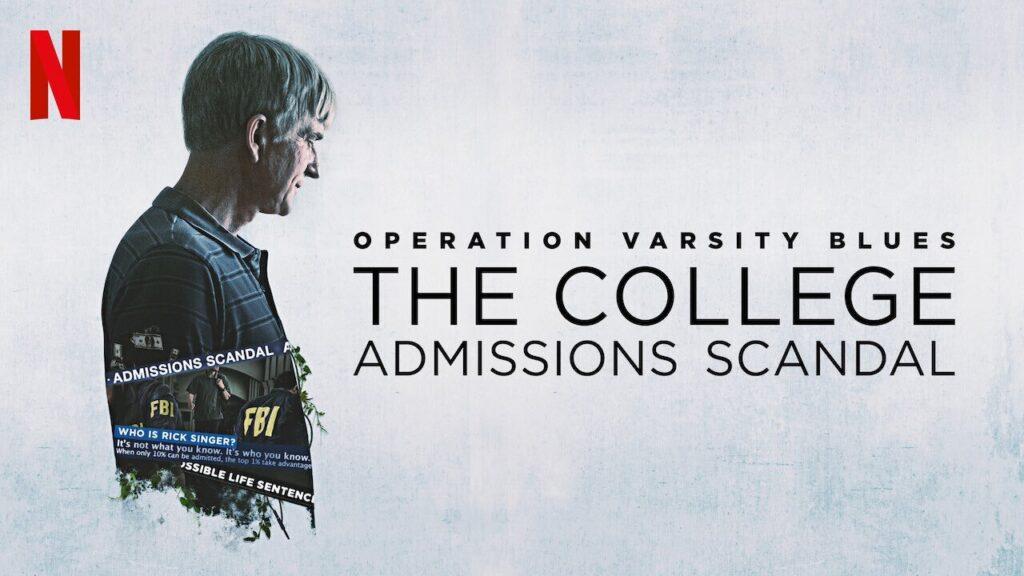★★★☆☆
Picture this: an amalgamation of secretive phone calls, celebrity involvement, millions of dollars and fake athletic scholarships that created massive public uproar. Netflix has continued to add to its slew of original documentaries over the last year with its recent release of “Operation Varsity Blues: The College Admissions Scandal,” a compelling, if somewhat limited, look at a scheme that has captured the attention of all ages and backgrounds.
The film examines the illegal enterprise headed by Rick Singer, who helped celebrities and the uber-rich gain admission to elite colleges for their children through illicit methods, including bribing university athletics coaches and forging test scores. This scandal hits especially close to home for Georgetown University students, considering multiple Georgetown families and a former Georgetown tennis coach have been implicated in the scheme.
The documentary succeeds in representing the core facts of the scandal and their relation to the college admissions process through its use of clever reenactions and expert testimonials. “Operation Varsity Blues: The College Admissions Scandal,” however, only interviews one individual who directly participated in the scheme, John Vandemoer. As the Stanford sailing coach, Vandemoer discussed prospective recruits with Singer and allegedly admitted unqualified candidates on his behalf.
The film creatively counters the reluctance of those directly involved in illegal activities to participate in the documentary with well-designed re-creation scenes. These scenes highlight the logic of the wealthy individuals participating in the cheating and how they justified the immorality of their choices.
Another area where the documentary succeeds is the organization of its content, which successfully highlights both the seriousness and ridiculousness of the scandal. YouTube videos of high school seniors near tears, struggling to accept rejection from their dream schools, are followed by a video of Olivia Jade, an influencer who gained admission as a fake rowing recruit to the University of Southern California through Singer’s plan, vapidly applying makeup on camera.

The show ends by centering its focus on one individual: Rick Singer, the mastermind behind the entire plan. By ending with a clip of Singer enjoying the warm weather at his private club, the movie emphasizes the fact that justice has not yet been served as the mastermind remains unscathed.
Despite these triumphs, the main interest of the documentary is found not in its design but in its subject matter. The facts of the scandal are highly sensational, and they ultimately outshine any of the cinematographic choices employed in this adaptation.
As much as everyone loves a rags-to-riches story, people also relish in their hatred of wealthy individuals who use their affluence to cut corners and take advantage of inequality. What makes this scheme so fascinating to the public is its celebrity element, the size and scope of its involvement and the way it threatens the already fragile belief in the validity of American society’s supposed meritocracy.
“Operation Varsity Blues: The College Admissions Scandal” fails to dive deeply enough into some of the topics it covers. While Singer’s system of falsifying standardized test scores is clearly laid out, a more extensive discussion of his bribery network and the timeline of his relations with individual school officials would have made the analysis of his master plan even more compelling. A more in-depth look at the roles of celebrities such as Lori Loughlin and Felicity Huffman would have also allowed the documentary to provide a more comprehensive understanding of the scandal. For people who have already been diligently following this scheme in the news, the documentary ultimately did not provide many groundbreaking revelations.
The film misses a chance to look further into the ways this scandal deconstructs the college admissions system. The legitimate college admissions professionals featured throughout the program provide surface-level conversations about the workings of college admissions and the ways in which Singer poisoned this process.
A larger dialogue on education inequality in the United States and the ways college admissions affects students would have provided richer context. After the conclusion of the film, the viewer is left wanting more information and a more profound analysis.













